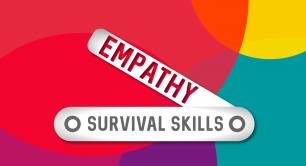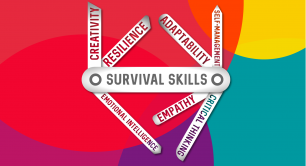Social Entrepreneurs' Survival Skill no. 7: Emotional intelligence
Want to manage relationships better, stay calm in a crisis and inspire others? Enter emotional intelligence – a key leadership skill and one that's vital for social entrepreneurs. Find out how to develop yours in this survival guide: with expert insight, a social entrepreneur interview and a downloadable activity.
People with high emotional intelligence are usually successful in most things they do. Why? Because they are who other people want on their team.
Emotionally intelligent people are masters at managing their emotions and don't get angry in stressful situations. Instead, they have the ability to look at a problem and calmly find a solution.
They're excellent decision makers, and know when to trust their intuition. Regardless of their strengths, however, they're usually willing to look at themselves honestly. They take criticism well, and know when to use it to improve their performance.
- Expert insight: The five elements of emotional intelligence
- Interview: “Emotional intelligence plays into creating a nurturing work culture”
- Resource: Six tips to improve your emotional intelligence
- Download: Three steps, three reflection questions
And because they have strong relationships with the people around them, and are calm in a crisis, they move through life far more smoothly than those who are easily angered or upset.
Emotionally intelligent people have the ability to look at a problem and calmly find a solution
Social entrepreneurs, as we know, often work in sensitive areas, with vulnerable people, and have to deal with many complex and unpredictable situations. Emotional intelligence can be a cornerstone in navigating these challenges.
Since emotional intelligence incorporates all of the previous skills covered in our Survival Skills for Social Entrepreneurs series, that makes it the most valuable skill of all.
What is emotional intelligence?
Emotional intelligence is the ability to recognise our emotions, understand what they're telling us, and to realise how they affect people around us.
In tandem with this is the ability to read other people's emotions, to understand them, not be fazed by them, and to manage them.
Emotionally intelligent people are really good listeners and understand what to say to people to make them feel better, and know how to inspire them to act.
Emotionally intelligent people, then, often have great leadership potential. Research by the Leadership Institute at the University of Nebraska, for instance, found that emotional intelligence was “positively related to the various dimensions of transformational leadership”.
Emotional intelligence incorporates all seven Survival Skills for Social Entrepreneurs – that makes it the most valuable skill of all
The five elements of emotional intelligence
American psychologist Daniel Goleman developed a framework of five elements that define emotional intelligence – self-awareness, self-regulation, motivation, empathy and social skills.
- Self-awareness: You understand your emotions, and because of this you don't let your feelings rule you. You are confident – because you trust your intuition and don't let your emotions get out of control. You are also willing to take an honest look at your strengths and weaknesses, and work on them to perform better.
- Self-regulation: You have the ability to control emotions and impulses. Typically, you don't allow yourself to become too angry or jealous, and don't make impulsive, careless decisions. You think before you act. You are thoughtful, comfortable with change, have integrity, and are able to say no.
- Motivation: You are willing to defer immediate results for long-term success. You are highly productive, love a challenge, and are highly effective in whatever you do.
- Empathy: You have the ability to identify with and understand the wants, needs, and viewpoints of those around you. Even when those feelings may not be obvious. (Find out more about empathy in Survival Skills for Social Entrepreneurs No 6.)
- Social Skills: You are easy to talk to and are typically a team player. Rather than focus on your own success first, you help others develop and shine. You can manage disputes, are an excellent communicator, and an expert at building and maintaining relationships.
As you've probably realised, emotional intelligence can be a key to success in your life – especially in your career. The ability to manage people and relationships is a vital attribute in all leaders, so developing and using your emotional intelligence can be a highly effective way to show others the leader inside of you.
“Emotional intelligence plays into creating a nurturing work culture” - Tessa Charupatanapongse
Tessa Charupatanapongse, based in Singapore, is the co-founder of MindTerra, a social enterprise that supports young professionals in Singapore and Thailand to develop their mental resilience and wellbeing.
In 2021, Tessa took part in the ASEAN Social Enterprises Development Programme, an accelerator programme supporting young people across south-east Asia to create positive changes within their community.
Below, Tessa talks with fellow social entrepreneur and Social Enterprise Academy facilitator, Rachael Millson, to discuss emotional intelligence and the impact it can have on individuals and organisations.
Racheal Millison: So Tessa, can you tell us about your social enterprise? How did MindTerra start?
 Tessa Charupatanapongse: It started in the early days of the pandemic, convening friends and friends of friends together for online writing sessions. We realised that writing had this healing power of bringing people together, making people feel safe and comfortable about being vulnerable.
Tessa Charupatanapongse: It started in the early days of the pandemic, convening friends and friends of friends together for online writing sessions. We realised that writing had this healing power of bringing people together, making people feel safe and comfortable about being vulnerable.
We then got a partnership with a journal company in the US called Passion Planner and did some workshops for their community, which brought in more people. So for a long time, MindTerra’s scope was journaling for your mental wellbeing.
But then my co-founder and I moved back to Asia from the United States and we wanted to pivot and create something for the Asian market, because we're both originally from Thailand. Right now we are working to improve workplace mental wellbeing and build resilient and nurturing workplaces through training workshops, tools and coaching.
There are two layers. One is understanding your own emotions. And the second is knowing what to do with those emotions
RM: Can you give us an example of the kind of training and workshops that you're offering?
TC: We tailor the training to what each company wants. It's kind of in two bits – the self-part and then the collective part. To build a resilient company and workplace culture comes first from your self-awareness – that you have to be aware of your emotions – and then when you're able to build that emotional awareness, you build confidence.
Then, we look at the collective company culture – it becomes like communication or empathy – how do we connect with others? It's really dependent on what the company wants, but it's around trust and communication, soft skills, coaching and nurturing leadership.
RM: The work that you're doing, as you've described, is very specifically focused on emotional intelligence with your clients, so it's perfect for this conversation. What do you understand by emotional intelligence when you hear those words? What does it mean to you?
TC: I think there are two layers to this. One is understanding your own emotions. And the second part is knowing what to do with those emotions. So that's for the self, but then there's also understanding other people's emotions and understanding how you relate to those emotions.
RM: It's what we do with that emotion or how it spills over into our interactions with others that can become a problem. Through the work that you're doing, are there any tips that you have in terms of self-management?
TC: This may sound really weird, but being grateful for it, because we're human, right? And part of what that means is that we have the capacity to feel all these complex feelings and emotions.
I think a lot of times when we feel emotions, especially the negative ones, there's this desire to just get rid of them. So: feeling it out, sitting with it, reflecting on it. Where did it come from? So you know for next time. Then it’s finding your own way to work through whatever you're going through, whether that's processing with a close friend or going for a walk. Everyone has their own way of managing that – so everyone needs to find that for themselves.
Often when we feel emotions, especially the negative ones, there's this desire to just get rid of them
RM: You’re supporting people to become more in tune with their emotions and find ways to enhance their emotional intelligence. Yet in some cultures, either national cultures or organisational cultures, it can still be quite a taboo subject whereby people don't necessarily see its value. Is there anything you can share about this and how it has impacted your work?
TC: Yeah, absolutely. I think, obviously, in Western cultures there is less stigma against these conversations. But what we are trying to convey is that by doing this, there's more stress, more burnout. There's a decline in productivity. There's more isolation, there's difficulty to connect with other people. And especially with the nature of work changing because of Covid.
We are now feeling a little bit more isolated. The boundary between work and home and private life has blurred with work – you're online all the time now. I think companies that care for their employees’ mental wellbeing and growth as a person, those are the ones that are going to flourish. Not just because they're caring for their people, but because when you care for your people, your people bring more, they're able to show up more presently for work.
RM: So what would you say are the top benefits to an organisation of really focusing on enabling emotional intelligence?
TC: Oh, that's a good question. I think trust and resilience really capture all of them. Linking that to Goleman's framework, it goes from the self to other people. You trust yourself, you trust your co-worker, and you trust your team.
When you are resilient in your own personal life that means you can be resilient in the workplace as well. And so when we're looking at the emotional intelligence spectrum of self and others, it plays really well into creating a great nurturing work culture overall.
RM: Can you give us an idea of how you have developed your own emotional intelligence?
TC: You are the only one who's going to be with yourself for the rest of your life. So why not spend some time getting to know yourself? I have been journaling since I was seven years old, when I was in third grade; it's just been a practice of putting pen to paper for me. I don't really have a structure but I find that with journaling, it's putting whatever is in my brain out into the world, releasing it and reflecting through that process.
RM: And how have you used the development of your own emotional intelligence to inspire or motivate others working with you?
TC: I think for me, it boils down to treating them as people and not as employees, and that goes back to communication. It's really just connecting with them as people and showing that genuine curiosity to learn more about their lives and their journey and how you can be a part of that journey.
RM: Is there anything else concerning emotional intelligence that you use that you think would be particularly useful to share with others?
TC: You really are the average of the five people you spend the most time with… I would say spend time with people who help you become better in the ways that you want to become better, who help you discover yourself and who push you in the right direction.
Spend time with people who are either filling your cup or making you feel more energised afterwards, instead of people who are taking away from you. I think through those positive interactions, you discover more about who you are. You discover yourself. You feel nurtured.
We want to see emotional intelligence as a capacity to nurture and develop. I think that this whole process is an ongoing one. It's something that continues to happen every day as we evolve – I don't think it's ever static.
Six tips to improve your emotional intelligence
The good news is that emotional intelligence can be developed. Try these six tips:
1. Observe how you react to people – Do you rush to judgement before you know all the facts? Do you stereotype?
2. Develop humility – You know your accomplishments and can be quietly confident about them. But give others a chance to shine and don't worry too much about getting praise for yourself.
3. Do a self-evaluation – Have the courage to look at yourself honestly: it can change your life. Take an emotional intelligence quiz to start this process.
4. Examine how you react to stressful situations – Do you get upset every time something doesn't happen the way you want? The ability to stay calm and in control in difficult situations is highly valued, so keep your emotions under control when things go wrong.
5. Take responsibility for your actions – People are usually more willing to forgive and forget if you make an honest attempt to make things right.
6. Examine how your actions will affect others – And do this before you take them. Put yourself in their place. How will they feel if you do this? If you must take the action, how can you help others deal with the effects?
More resources to develop emotional intelligence:
|
Catch up on all seven Survival Skills for Social Entrepreneurs.



